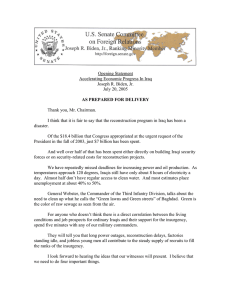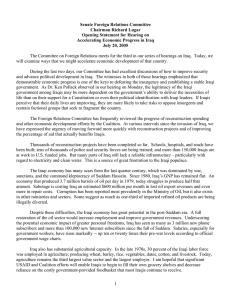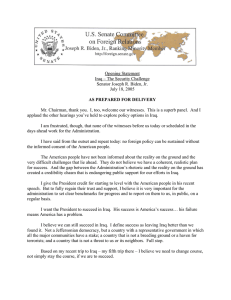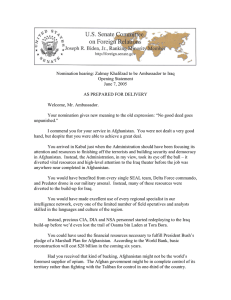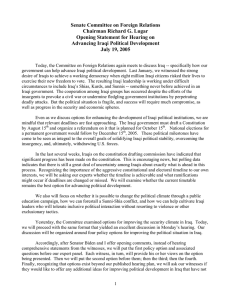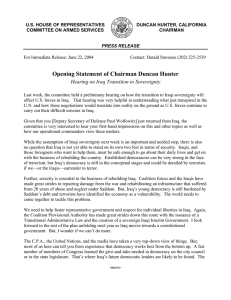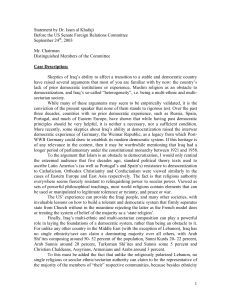Ronald L. Schlicher, Deputy Assistant Secretary of State for Near... and Iraq Coordinator
advertisement
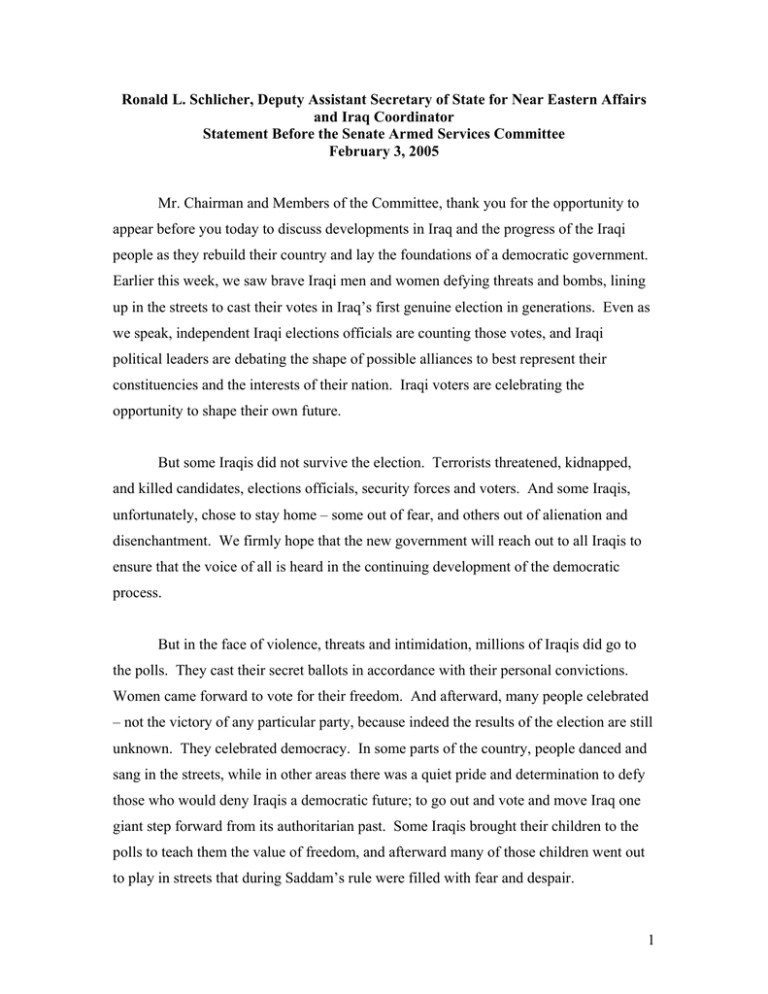
Ronald L. Schlicher, Deputy Assistant Secretary of State for Near Eastern Affairs and Iraq Coordinator Statement Before the Senate Armed Services Committee February 3, 2005 Mr. Chairman and Members of the Committee, thank you for the opportunity to appear before you today to discuss developments in Iraq and the progress of the Iraqi people as they rebuild their country and lay the foundations of a democratic government. Earlier this week, we saw brave Iraqi men and women defying threats and bombs, lining up in the streets to cast their votes in Iraq’s first genuine election in generations. Even as we speak, independent Iraqi elections officials are counting those votes, and Iraqi political leaders are debating the shape of possible alliances to best represent their constituencies and the interests of their nation. Iraqi voters are celebrating the opportunity to shape their own future. But some Iraqis did not survive the election. Terrorists threatened, kidnapped, and killed candidates, elections officials, security forces and voters. And some Iraqis, unfortunately, chose to stay home – some out of fear, and others out of alienation and disenchantment. We firmly hope that the new government will reach out to all Iraqis to ensure that the voice of all is heard in the continuing development of the democratic process. But in the face of violence, threats and intimidation, millions of Iraqis did go to the polls. They cast their secret ballots in accordance with their personal convictions. Women came forward to vote for their freedom. And afterward, many people celebrated – not the victory of any particular party, because indeed the results of the election are still unknown. They celebrated democracy. In some parts of the country, people danced and sang in the streets, while in other areas there was a quiet pride and determination to defy those who would deny Iraqis a democratic future; to go out and vote and move Iraq one giant step forward from its authoritarian past. Some Iraqis brought their children to the polls to teach them the value of freedom, and afterward many of those children went out to play in streets that during Saddam’s rule were filled with fear and despair. 1 The election process was not perfect. We have heard reports of logistical problems, voting irregularities, and communities that did not have an opportunity to vote. In a process of this magnitude, carried out in this short timeframe, under such challenging security conditions, these kinds of problems were expected. The Independent Electoral Commission of Iraq (IECI), charged with administering the elections from top to bottom, is also charged with hearing and resolving all challenges and complaints to the electoral process. Meanwhile all Iraqis should be pleased with the preliminary report of the International Mission for Iraqi Elections – the international mission established to observe the elections – which found that “Iraq’s Electoral Commission has prepared and put in place a framework for an election that generally meets recognized standards in terms of election law, planning, and preparations.” And they can be pleased by the courage and professionalism demonstrated by Iraqi police and security forces, which played an essential role in safeguarding the elections and preventing their disruption by the insurgents and terrorists. Without question, the Iraqi people still have a long struggle ahead. But we will stand resolutely beside them. The sacrifices of the Multi-National Forces-Iraq to ensure security and assist with logistics, the tireless work of American civilian and military personnel – including, if I may be excused some pride, the tremendous job done by Ambassador Negroponte and his dedicated staff at the Embassy in Baghdad and Embassy offices throughout Iraq – and the contributions of the international community helped make their great day possible. As called for in UN Security Council resolution 1546, the United Nations provided critical assistance to the IECI. We look forward to continued UN involvement in Iraq's political transition. Mr. Chairman, I would like to describe our understanding of the next steps of the political process, according to the Transitional Administrative Law (TAL) and the regulations of the Independent Electoral Commission of Iraq (IECI). In most areas, 2 voters participated in two elections simultaneously – the national election and their respective provincial election. In addition, voters in the Kurdish areas in northeastern Iraq participated in an election for the Kurdistan Regional Government. Immediately after the close of polls, election workers at each poll began to count the ballots. When they were tallied, those results were secured and physically transported to the IECI national headquarters in Baghdad for tabulation. Once the IECI has received and tabulated all of the results from the more than 5,000 polling stations around Iraq, it will begin to calculate the allocation of seats to the respective assemblies – the 275-seat Transitional National Assembly (TNA), the 18 provincial assemblies, and the Kurdistan Regional Government. The IECI has stated that it expects to announce the progress of the tally periodically; its target for final results is February 15. Meanwhile, we understand that political parties have already begun negotiating the shape of the coming government, on a speculative basis, as they await the election results. Once the allocations of seats are announced, we expect that the Transitional National Assembly (TNA) will convene. The Assembly’s first responsibility is to elect its own leadership and adopt internal rules. It will then select, by a two-thirds majority vote, the three-member Transitional Government Presidency Council, consisting of the President of the State and two Deputy Presidents, on a single slate. Under the TAL, the three members of the Presidency Council are required to unanimously name a Prime Minister within two weeks. If the Presidency Council fails to name a Prime Minister within two weeks, the responsibility moves to the TNA, which in this instance must confirm a nomination by a two-thirds majority. The Prime Minister then has up to one month in which to name a Council of Ministers. If the Prime Minister is unable to nominate a Council of Ministers within one month, the Presidency Council shall name another Prime Minister. 3 The Prime Minister and Council of Ministers must then be approved by a simple majority vote of the TNA before commencing their work as a government. The current Iraqi Interim Government Prime Minister and Council of Ministers will remain in place until their replacements are confirmed. Upon confirmation by the TNA, the new Prime Minister and Council of Ministers will assume power The new transitional government will govern for only a limited period of time. Its primary task will be drafting a new constitution, which, according to the TAL timeline, is to be completed by August 15 and put before Iraqi voters in a referendum not later than October 15. If Iraqi voters approve the constitution, they will vote again according to its precepts for a permanent government by the end of this year. We believe that the development of the political process will encourage all Iraqis to put faith in their elected officials as they continue to work with MNF-I forces to improve security. The key to U.S. force reduction in Iraqi is improving the readiness and training of the Iraqi Security Forces; our goal remains doing all we can to facilitate Iraqis becoming responsible for their own security in all its aspects. An essential part of this effort, in addition to training, will be the dedication, patriotism, and courage of the Iraqi security forces and their leadership, whose members step forward – as they did on election day – in defense of their country to overcome the terrorism, threats and intimidation directed against them and their families. We have seen a steady increase in capability as measured by success in fighting on the ground. Iraqi forces had limited success in the fighting last April. But since then, they have done steadily better in the disarming of the Sadr militia in August and the fighting in Fallujah in November. Most recently, security forces displayed vigilance and preparedness in providing security for the elections. My colleagues from the Department of Defense are here today to address how we are training the soldiers, and how we are inculcating leadership skills, including through 4 promising experiments with advisory teams. I would like to make two points to add to their remarks: First, this is an area in which international engagement is necessary and has been forthcoming. On the military side, NATO has begun its training mission, which will be specializing in officer and staff training. NATO training will expand rapidly as its instructors arrive on the ground in Iraq. Jordan has offered to host some NATO training, and Norway has already hosted a course for senior officers. Other countries are also pitching in, including Egypt, which has trained several hundred soldiers. On the police side, we have Police Liaison Officers from a number of countries helping with on-the-ground mentoring in Iraq. Again, we should recognize the contribution of Jordan, which has helped us set up the International Police Training Center near Amman. Germany has trained 400 police in the UAE, and France has offered out-of-country training to up to 1,500. Second, security can only move forward in tandem with the political process. Soldiers will fight only if they have something to fight for. In this regard, I would like to highlight the successful cooperation between the Iraqi Security Forces and the Independent Electoral Commission of Iraq, a partnership that further demonstrated that Iraqi forces will fight for responsible Iraqi political leadership and defend the Iraqi public against aggression. Mr. Chairman, the security situation in Iraq is still difficult. There are still thousands of insurgents, loose weapons and explosives are still easily obtained, and terrorists are still able to assassinate and kill. We have seen no diminution in the number of incidents. But the elections will, I believe, have a longer-term effect on security. They can help to convince those who are sitting on the fence that an elected, legitimate government of Iraq is empowered and here to stay, that it is receiving support from Iraqis of all 5 ethnicities, religions, and provinces; and that, in the end, the solution to their problems lies within the political process, and not with the ranks of the insurgents. By voting, millions of Iraqis have told the insurgents they are not wanted. The Iraqis have decided that security and the freedom to choose are what is important to them. We hope that those Iraqis who have heretofore been undecided will take heart form the courage and democratic yearnings of their fellow citizens, and make the environment much tougher for insurgents to operate in. Engaging the population in the political process – especially in the process of drafting the new Iraqi constitution – is a key to changing the security environment for the better. As the Iraqi Transitional Government gains the trust of Iraqis, Iraqis will make the country less hospitable to the insurgents. This will take time, patience – and commitment. It will also require our continued commitment to help the Iraqi people rebuild their country. Iraqis need and deserve to see the quality of their daily lives improved. Hand in hand with increased security, Iraqis want dependable electricity and water and medical care. Closely coordinated with the Iraqi government, our reconstruction efforts have made progress in restoring essential services, expanding the availability of quality medical assistance, rehabilitating public buildings and roads, advising the government on economic and financial reforms, and introducing Iraqis at all levels to the basics of democratic practice and rule of law. Most of this work occurs out of the media spotlight. It is easy to overlook the progress when compared to the monumental challenges that remain in a country so devastated by decades of conflict and Saddam’s neglect. But despite the continuing hardships of their daily lives, Iraqis know and appreciate what donors are doing to help accelerate reconstruction and promote economic and political reform. The election demonstrates the importance of programs to promote democracy and re-forge the links of civil society. 6 Despite the formidable security challenges, we have now obligated $13 billion (or 62 percent) of the $20.9 billion in Iraq Relief and Reconstruction (IRRF) I and II funds. We have disbursed over $4.7 billion, or 22 percent of the total. We continue to adapt our programs to circumstances on the ground in order to ensure that funding is available for the most urgent needs. We appreciate the support from Congress we have in all these efforts, including recent efforts to reallocate Iraq reconstruction resources. As we enter this post-election period, our reconstruction efforts will be focused on assisting the Iraqi Transitional Government to improve security, create jobs, develop economic policy and regulatory frameworks, and expand private enterprise. Establishing momentum toward longer-term stability will help improve the climate for other donors and private investors to join the reconstruction and economic development effort, stimulate economic growth, and enable the Iraqis to progressively assume a greater role internationally. Let me be clear: I think Iraqis are anxious to take on that role. In fact, they have already begun to speak loudly and proudly on the international stage. As President Bush said on the day of the elections, “The people of Iraq have spoken to the world, and the world is hearing the voice of freedom from the center of the Middle East.” Mr. Chairman and Members of the Committee, thank-you again for the opportunity to testify about our progress in Iraq. I look forward to answering any questions you may have. 7


